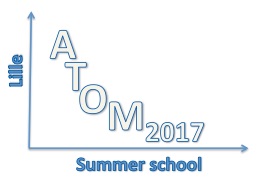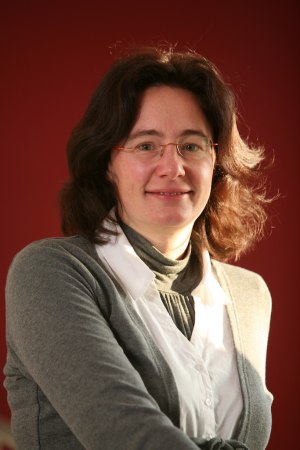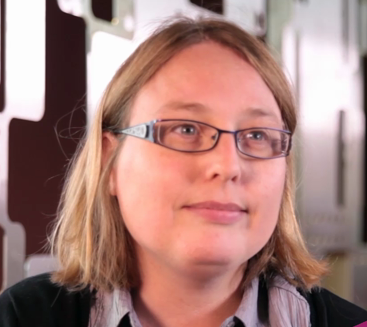|
|
|
SpeakersConfirmed Speakers
Clarisse Dhaenens
Bio Clarisse Dhaenens is a full professor at the University of Lille. She is currently the vice-head of CRIStAL research laboratory. She obtained her PhD in 1998 from the polytechnicum University of Grenoble (INPG). She became an associate professor in 1999 at the University of Lille and a full professor in 2006. Clarisse Dhaenens works deal with operations research, combinatorial optimization with applications in knowledge discovery for bioinformatics and healthcare. She is, for example, interested in multi-objective optimization and links between structures of problems and their solving. She has just written a book with Laetitia Jourdan “metaheuristics for big-data” Application: Multi-objective optimization for knowledge discovery in big data Classical knowledge discovery tasks, such that classification, feature selection, association rules mining may be seen as multi-objective combinatorial optimization problems. Indeed, in many cases, some elements have to be combined to produce the solution that may be evaluated thanks to several quality criteria (it is usually necessary to maximize the specificity of the extracted knowledge while maximizing its generality to be applicable). Hence efficient multi-objective optimization techniques may contribute to extract interesting knowledge from datasets. In a context of big data, some additional specificities have to be taken into account, and metaheuristics are well suited to address them. In this course we will present how knowledge discovery tasks may be modelled as multi-objective optimization problems and give some insight on how to solve them.
Xavier Gandibleux
Bio Full Professor in Operations Research and Computer Science. Active in the field of multi-objective optimization and metaheuristics. Leader of the «Operations Research and Multi-Objective Optimization» group. Coordinator (since 2013) of the Master Program in Computer Science for the Université de Nantes. Founder and Former Coordinator (2008-2013) of the MSc in Computer Science International Track "Optimization in Operations Research" (Université de Nantes, Ecole des Mines de Nantes, Université libre de Bruxelles). Coordinator of the ANR-DFG project vOpt (2015-2018).
Dylan Jones
Bio Dr Dylan Jones is a Professor of Operational Research based in the Department of Mathematics at the University of Portsmouth. He is the Director of the Centre of Operational Research and Logistics (CORL). Prof Jones’s main area of expertise is the theory and application of decision problems with multiple conflicting objectives. He has published over 50 scientific articles on this topic and a keynote book on goal programming. Prof Jones has worked extensively on the application of Operational Research in various fields of application including healthcare planning and logistics, management of networks of container ports, the logistics of marine renewable energy, financial portfolio selection, and socio- economic applications such as analysing cinema going behaviour. His work has been funded by the Engineering and Physical Sciences Research Council, Royal Society, European Union, Operational Research Society, and Technology Strategy Board.Application: Multi-objective optimization for knowledge discovery in big data Goal programming, an overview of the state-of-the art and an application to renewable energy planning. This seminar will give an overview of the goal programming technique, including an application from the field of renewable energy planning. In the first part of the seminar the concept of, and philosophy behind goal programming will be presented. The three major variants will be presented and a map of the current state-of- the-art will be discussed. The linkage with distance metric optimisation will be explained. The variants will be illustrated by use of a small example. The author will then present a quantitative models relating to the location of offshore wind farms. The model, concerned with location analysis of UK Round 3 wind farm sites, will be described in detail. An extended goal programming model will be built that considers socio- economic, technical, and environmental objectives. A weight sensitivity analysis method is applied and the results described. Laetitia Jourdan
Bio Pr. Laetitia JOURDAN (F) is currently full Professor in Computer Sciences at University of Lille 1/CRIStAL. Her areas of research are modeling datamining task as combinatorial optimization problems, solving methods based on metaheuristics, incorporate learning in metaheuristics and multiobjective optimization. Pr. Jourdan received a master degree in computer science and mathematics for University Paris Dauphine in 1999. Pr. Jourdan hold a PhD in combinatorial optimization from the University of Lille 1 (France). From 2004 to 2005, she was research associate at University of Exeter (UK). Then she was researcher with tenure at INRIA. She holds his dissertation to lead researches (“HDR: Habilitation à Diriger des Recherches”) from the Univ. of Lille in 2010. She directed and co-supervised nine PhD and twelve Master students. She is (co)author of more than 100 papers published in international journals, book chapters, and conference proceedings. She organized several international conferences (LION 2015, MIC 2015, etc) and is reviewer editor for frontier in Big Data . Application: Multi-objective optimization for knowledge discovery in big data Classical knowledge discovery tasks, such that classification, feature selection, association rules mining may be seen as multi-objective combinatorial optimization problems. Indeed, in many cases, some elements have to be combined to produce the solution that may be evaluated thanks to several quality criteria (it is usually necessary to maximize the specificity of the extracted knowledge while maximizing its generality to be applicable). Hence efficient multi-objective optimization techniques may contribute to extract interesting knowledge from datasets. In a context of big data, some additional specificities have to be taken into account, and metaheuristics are well suited to address them. In this course we will present how knowledge discovery tasks may be modelled as multi-objective optimization problems and give some insight on how to solve them.
Nicolas Jozefowiez
Bio Nicolas Jozefowiez obtained his Ph.D. in Computer Science from the University of Lille 1 in 2004. He was after that a Fulbright visiting scholar for one year at the University of Colorado at Boulder. Since 2008, he is an associate professor in computer science at INSA Toulouse and LAAS-CNRS. His research interests are about combinatorial optimization, multi-objective optimization and algorithms, based on integer programming or heuristics, to solve these problems with a special interest for problems related to transportation and spatial. Abstract The goal is to present the use of multi-objective optimization in vehicle routing problem and to offer the keys in identifying the relevant objectives and in designing efficient methods to solve these problems. We will discuss the objectives common in the literature and their classification as well as their meaning starting from the most basic problem, the traveling salesman problem, and according to the enrichment brought to the problem : single or multiple vehicles, information on the graph … The opportunity to combine some objectives will also be discussed as well as their use in important application fields (green logistics, humanitarian logistics …). We will conclude by examining the use of methods usually applied to vehicle routing problems : meta-heuristics (Tabu search, genetic algorithmes), polyhedral approach (Branch-and-cut) and column generation.
Bio Joshua Knowles is Professor of Natural Computation at the University of Birmingham UK. His research interests are global optimization, machine learning and decision making. He has worked on multi-objective optimization since 1998, and, in collaboration with others, has developed several recognised techniques, e.g. the PAES local searcher; an elitist version of NSGA (before NSGA-II); an early hypervolume-maximising algorithm; "multi-objectivization"; MOCK multiobjective clustering algorithm; and, ParEGO surrogate-assisted multiobjective algorithm. His current interests include applied work in closed-loop optimization, where such algorithms are used to optimize a live or physical system, for example for drug development, or improvement of manufacturing systems.
Evolutionary and Surrogate-Assisted Multi-Objective Optimization
This talk will introduce the main ideas used in developing successful metaheuristics (approximate methods) for MOP, focusing particularly but not exclusively on evolutionary algorithms. We will look at the history, progress, and open problems in this area. In the second half, we will consider the common practical challenge that arises if function evaluations are highly expensive, and review how surrogate-assisted methods can be designed and evaluated in these contexts. A number of real-world examples will be given.
Filip Logist
Bio Filip Logist obtained a Master’s and PhD degree in Chemical Engineering from the KU Leuven in 2003 and 2008. Afterwards he has been a post-doctoral researcher at KU Leuven (division: BioTeC headed by Jan Van Impe). In this period he has been an active member of the Center-of-Excellence Optimization in Engineering OPTEC (of which he also served as the Scientific Manager). He has been an assistant professor (docent) for Industrial Measurement and Control Technology within KU Leuven’s Chemical Engineering department from October 2013 till April 2016. Since April 2016 he took up responsibilities in the chemical industry in the field of Advanced Process Control, while still continuing as a guest lecturer. His interests are (i) modeling and identification of dynamic (bio)chemical systems as well as (ii) their model based control and optimization. He is one of the two Belgian representatives in the Computer-Aided Process Engineering (CAPE) Working Party of the European Federation of Chemical Engineering (EFCE). He is also a member of the Technical Committee on Chemical Process Control (TC6.1) of the International Federation of Automatic Control (IFAC). He has (co-)authored more than 50 international journal publications and more than 70 peer-reviewed full papers at international conferences. Over the period 2008-2016, he (co)supervised 7 successfully defended PhD theses. He has been a PhD committee member of 8 PhD theses.
Multi-objective optimisation in a dynamic and uncertain world. Mathematical models and numerical optimisation strategies are nowadays invaluable tools in view of an efficient design and operation of real-world processes. However, this rises different challenges. Processes are often dynamic, giving rise to challenging and large-scale optimisation problems. Moreover, multiple and conflicting objectives arising from practice have to be included. Consequently, multi-objective dynamic optimisation problems arise, which have to be solved efficiently. Finally, also the question of robustness against uncertainty of the obtained solutions arises as model uncertainty and model-process mismatch are inevitable in practice. In this talk I will illustrate some recent developments in the field of model-based multi-objective optimisation under uncertainty for dynamic processes. These developments include, e.g., interactive scalarisation approaches for multi-objective optimisation and approximation strategies for optimisation under uncertainty. Also tools for interactive multi-objective optimisation under uncertainty will be presented. Selected case studies used for illustrating these developments involve bioprocesses, e.g., fed-batch bioreactors, as well as chemical processes, e.g., chemical vapor deposition reactors. Patrice Perny
Bio Patrice Perny received the Ph.D. degree in Computer Science and Operations Research in 1992 from University Paris Dauphine and Habilitation degree in 2000 from University Pierre et Marie Curie (UPMC, Paris 6). He became Associate Professor in 1992 at University Pierre et Marie Curie (UPMC), Paris, France, and full Professor in 2002. He is currently head of the Decision making, Intelligent System and Operations Research department at LIP6. His activities concern preference modeling, multiobjective optimization, decision and optimisation under uncertainty and risk, computational social choice and algorithmic game theory. He works on the elaboration of preference models for decision making, and on the development of algorithms allowing the fast determination of preferred solutions in combinatorial decision problems. The applications concern decision support systems (rational preparation of important human decisions) and automatic decision making (autonomous decision agents). Abstract In multiobjective combinatorial optimization problems, Pareto-optimal solutions are often very numerous and some additional preference information is needed to better discriminate between these solutions. Several preference models have been proposed in the literature to refine Pareto dominance, modeling various sophisticated behaviors in the aggregation of criteria, and allowing to define an optimal compromise solution. In this talk we will focus on the practical determination of such compromise solutions.
We will present some issues linked to the optimization of sophisticated decision models (partial dominance relations, non-linear aggregation functions) on combinatorial domains and introduce some preference-based search procedures to determine the optimal compromise solutions in various multiobjective optimization problems. We will use examples in graphs or in mathematical programming with possible applications in various contexts such as multicriteria optimization, fair optimization in multi-agent decision-making, and robust optimization under uncertainty. Anthony Przybylski
Bio Anthony Przybylski is "Maître de conférences" in the Computer science department (teaching) of the Faculty of Science of University of Nantes, and in the IRCCyN laboratory (research). He is the head of a Msc. in Operations Research since the academic year 2013-2014. His research interests are the exact solution of multi-objective combinatorial optimization problems, and multi-objective mixed-integer linear programs. Exact Solution Methods for Multi-objective Combinatorial Optimization We consider the solution of multi-objective combinatorial optimization problems, with the assumption that the preferences of decision makers are not known. In this context, an exact solution means that the "whole" set of efficient solutions must be determined. We will first present the scalarization methods which purpose is to determine (weakly) efficient solutions. Next, we will present the main lines of enumerative solution methods, with a particular distinction between the bi-objective case and the multi-objective case (i.e. three objectives and more).
Vincent T'Kindt
Bio Vincent Tkindt is a full professor on Operations Research at the Polytechnique College of the University of Tours (Polytech Tours). He is currently the head of a research team from the CNRS on Operations Research, Scheduling and Transportation. He hold his PhD in 1999 before being an assistant professor in 2000 at Polytech Tours and a full professor since 2008. His main research interests are on scheduling (with one or several objectives), mathematical programming and complexity theory. He published a book on multicriteria scheduling in 2002 (revised in 2006) has well has many papers in international journals.
Daniel Vanderpooten
Bio Daniel Vanderpooten is a Professor in Computer Science and Operations Research at Paris Dauphine University and member of the research center Lamsade. He is the head of the Master program "Modeling, Optimization, Decision, Organization" at Paris Dauphine University and head of the research team "Multiobjective optimization" at Lamsade. His research interests are Operations Research, Multiple Criteria Decision Analysis, Combinatorial Optimization, Robust Optimization. He has published over 50 scientific articles on these topics in international journals. Abstract Due to the difficulty of most multiobjective problems, a theoretically appealing and practically competitive approach is to look for approximations of the solutions sets of interest. We focus here on approximations with a priori guarantees on the quality of the returned approximations and/or on the required computation time to generate such approximations.We present basic concepts and review main results in this field. |
| Online user: 1 | RSS Feed |

|

 Professor, CRIStAL, Université de Lille 1, France -
Professor, CRIStAL, Université de Lille 1, France -  Professor, University of Nantes, France
Professor, University of Nantes, France Professor, University of Portsmouth, UK
Professor, University of Portsmouth, UK  Professor, CRIStAL, Université de Lille 1, France
Professor, CRIStAL, Université de Lille 1, France  Associate Professor (HDR), LAAS, Toulouse, France
Associate Professor (HDR), LAAS, Toulouse, France  Professor, University of Birmingham, UK
Professor, University of Birmingham, UK  Associate Professor, Katholieke Universiteit Leuven, Belgique
Associate Professor, Katholieke Universiteit Leuven, Belgique  Professor, LIP6, université "Pierre et Marie Curie" , France
Professor, LIP6, université "Pierre et Marie Curie" , France Associate Professor, IRCCyN, Université de Nantes, France
Associate Professor, IRCCyN, Université de Nantes, France  Professor, University of Tours, France
Professor, University of Tours, France Professor, Université Paris 9 Dauphine, France
Professor, Université Paris 9 Dauphine, France